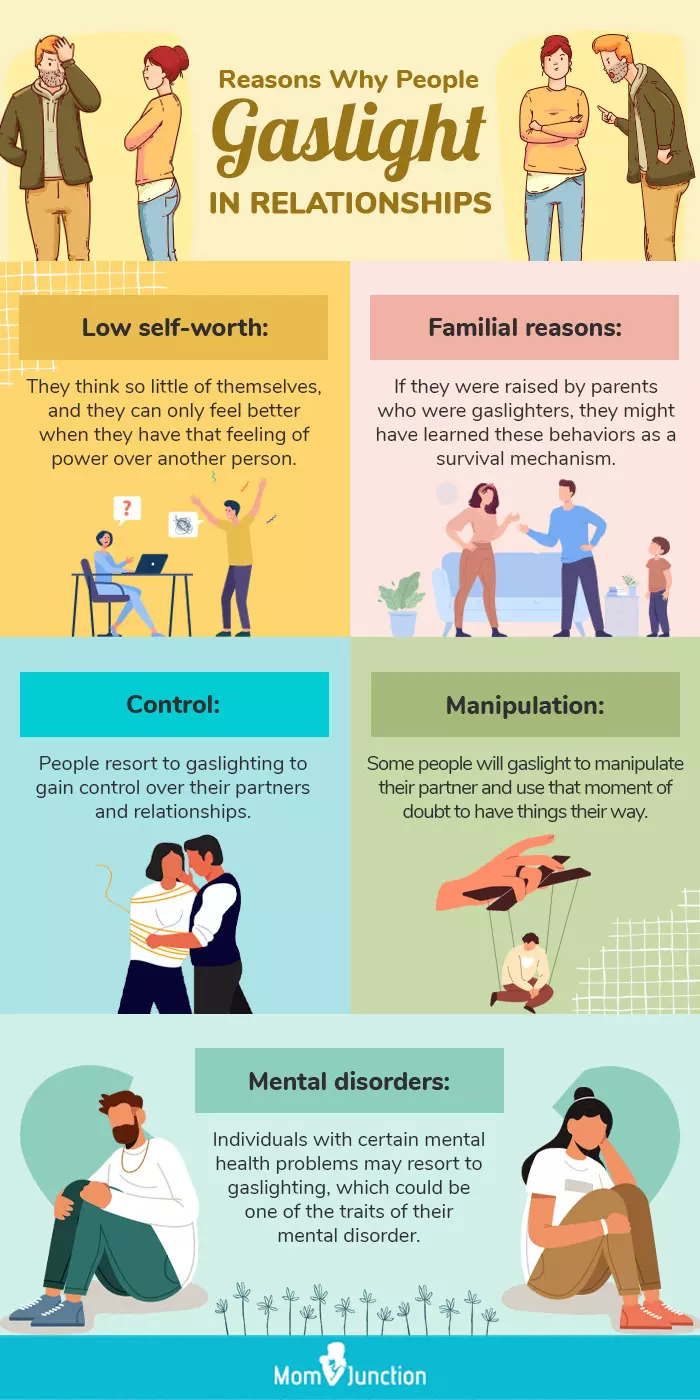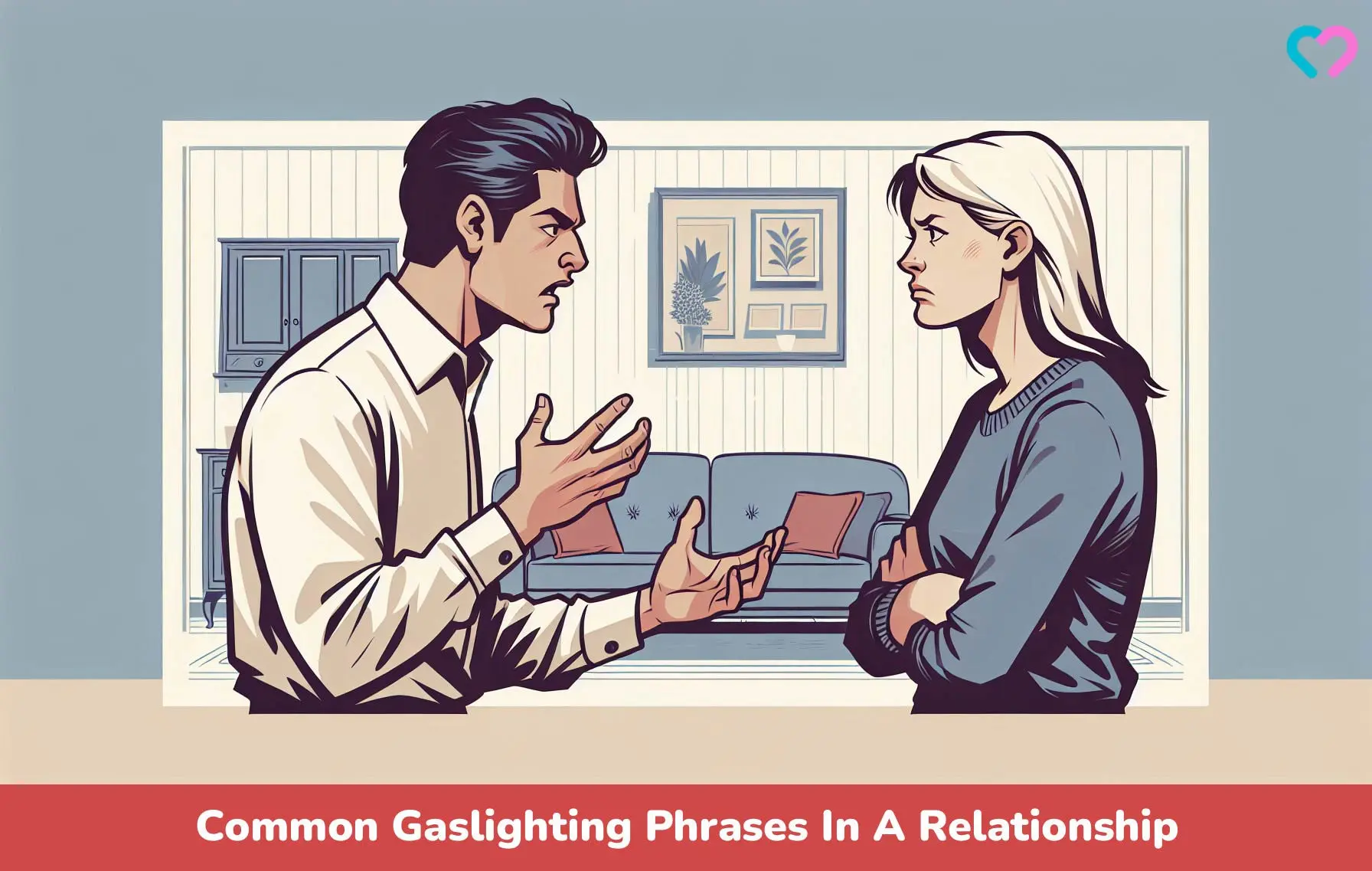
Image: iStock
Your partner has been making you feel bad by saying, ‘You look bad in that outfit,’ ‘You eat too much,“ I guess you are overreacting, dear.” “You might need help.” “You’re being insecure.” Do you often hear such gaslighting phrases that make you introspect and get anxious? If yes, then you could be a victim of gaslighting. Gaslighting is psychological abuse that could make you feel irrational. It is an excellent deception and intimidation technique that hides the reality from you and manipulates you such that you can go ‘crazy.’ One often loses trust in their “gut instinct (1).” Abusive and narcissistic partners often use this exploitation strategy to take control of their partner and trap them in a confused zone and do what they want inside and outside the relationship. If you sense that your partner is a subjugator and is brainwashing you, then knowing some common gaslighting phrases can help you. Once you are certain of their behavior and feelings, you can take action accordingly.
Here are some more phrases that a gaslighter uses.
Key Pointers
- Gaslighting is an abusive manipulation tool used to make someone feel irrational and question their own beliefs and actions.
- Narcissists and emotional abusers commonly use this technique to control someone and make them feel guilty and confused.
- Abusers often tell their victims that they are too emotional, they are imagining things, and that everything is their fault.
- Gaslighters victimize themselves and convince their victims that no one else would love them or believe them.
- Dealing with a gaslighting abuser requires firm boundaries, conviction, and confidence in one’s thoughts and beliefs.
Signs Of Gaslighting In A Relationship
Gaslighting is so subtle that it often goes unnoticed. However, it can tear your self-confidence over time, leaving you confused, uncertain, or even questioning your sanity. Therefore, recognizing the signs that indicate gaslighting can help you safeguard your well-being (1) (2).
- Blocking or diverting: Instead of addressing the issue, gaslighters change the subject or accuse you of something unrelated. If you express a concern, they might say, “Why do you always have to be so negative?” to shift the blame.
- Trivializing: They downplay your emotions, making you feel like you’re overreacting. Statements like “You’re too sensitive” or “That’s not a big deal” make your feelings seem unimportant. Constant trivializing can trigger self-doubt about how you respond to situations.
- Lying and deception: Gaslighters distort facts, tell outright lies, or selectively omit essential information to maintain control over the situation. They may also act like past conversations or promises never happened, causing you to question your memory. Even when you’re confident, they insist, “I never said that,” leaving you deeply confused and in self-doubt.
- Belittling and humiliation: Through insults, sarcasm, or constant criticism, they undermine your self-esteem. Whether in private or public, they make you feel small and unworthy. You’re useless,” “That’s great, you really know how to mess things up,” and “Why do you always make such dumb mistakes?” are some common phrases gaslighters use to shame or guilt-trip their victims.
- Withholding affection and attention: They withdraw love, communication, or physical affection to exert control and make the other person emotionally desperate. They use silent treatment to make the individual feel they must “earn” affection or approval. This form of emotional manipulation can lead to feelings of anxiety, self-doubt, and confusion.
- Isolation: They discourage you from maintaining relationships with friends and family, making you more dependent on them. They may say, “Your friends don’t really care about you,” or “I’m the only one who understands you.” They do so to create an environment where the victim feels alone, confused, or trapped, which makes them more susceptible to influence.
41 Gaslighting Phrases In A Relationship
Gaslighting in relationships can be subtle yet deeply damaging, making you question your own reality and emotions as Dr. Childs describes, “Gaslighting is a form of emotional manipulation by someone to make you feel as if your feelings aren’t valid or what you think is happening isn’t really happening (1).”
Shea Emma Fett, a blogger, recounts how her partner gaslights her. She says, “Every gaslighter/gaslightee relationship is different, but for me, there was a very specific pattern. I would say something to him, and he would have a very strong emotional reaction to it, far above what I would have anticipated. I would backtrack and try to figure out what I had said and how to make it better. He would accuse me of inconsistency when I backtracked. I would try to explain that I was adjusting to try to communicate best with him because clearly I was failing. He would tell me that my inconsistency implied that I was lying. I would say no, no, I know I’m not lying. Maybe I just can’t remember it right. “It seems I can’t trust your memory,” he would say. We would never return to the original issue. I usually ended up crying hysterically (i).”
1. ‘You are too emotional.’
One of the characteristics of a gaslighter is apathyiLack of interest or concern, indifference . Your responses to their conduct could be right, but they proclaim that you overreact. At times, you might wonder if you are really overthinking, which is how the gaslighter manipulates you. Your emotional response is likely normal while theirs isn’t considered emotion.
2. ‘Stop misunderstanding me.’

When you accuse your partner of something, they might turn the tables on you, saying you always misunderstand them. They use this strategy to divert your attention and emotionally manipulate you into believing you are hurting them.
3. ‘You are ungrateful.’
When you get a slight hint that something is wrong with your subjugative partner, they twist the circumstances against you.
For example, they may assert they have sacrificed things for you, and you are unappreciative. Eventually, they blame you and escape from the situation.
4. ‘You don’t love me as I do.’
When things start turning sour for them, they play the victim card to gain sympathy from you. They might say, ‘you don’t trust me,’ or ‘you don’t love me.’ Such gaslighting phrases might make you doubt that you are not a good partner.
 Did you know?
Did you know?5. ‘You make me upset.’
A gaslighting or oppressive partner can take you on a guilt tripiA feeling of guilt or responsibility for something, especially one induced by others by using common gaslighting phrases such as ‘you don’t understand me,’ or ‘you make me look bad.’ Though you are unhappy due to their actions towards you, they snappily make you the culprit for their emotions that they are often trying to not feel or acknowledge.
6. ‘Your friends make fun of me.’
A gaslighter wants you to stay isolated.
Hence, they try to turn you against your friends or family. They might tell you that your friends do not behave well or are trying to weaken your bond. This tactic helps them rule over you when you are alone and without support from your loved ones.
7. ‘You imagine things.’

They may try to make you look foolish using white liesiA harmless lie told to avoid hurting someone . It is common for a gaslighter to show you in a bad light, making you a victim of something untrue. They might tell you are overanalyzing things so that you doubt yourself.
8. ‘Don’t damage my personality.’
No, it’s not you. Their actions damage their personality and your relationship, but they accuse you of doing so. Remember, people are responsible for their character, and nobody else can make or break it. If they have been disrespected for their behavior by their friends or colleagues, they try to make you feel responsible and fall in agony.
 Do remember
Do remember9. ‘You have gained weight.’
Narcissists and abusers criticize and oppress their partners and try to look superior to them.. If your partner has been making you feel bad by saying, ‘You look bad in that outfit,’ ‘You eat too much,’ or ‘You should lose weight to look like my friends,’ they are trying to pull you down.
10. ‘Don’t make up stories.’
Your partner has done something wrong, and you caught him red-handed. Instead of accepting, they tell you that you are making stories to show them in a bad light. For example, you found them talking to someone outside of the relationship, and when you question them, they say you are cooking up things or list many reasons why they have to “legitimately” talk to the person.
11. ‘You are jealous.’
Whenever your partner says you are insecure and too possessive, know that they are up with something. Instead of consoling you and answering your questions, they transfer the blame to you and your actions.
12. ‘Everything is your fault.’

Arguments and disagreements are common in a relationship. But if your partner condemns you for everything you do and never appreciates you, then they are gaslighting you. A loving partner would not say that you are completely wrong and try to balance the situation. But a gaslighter would shift all the immoral things towards you. It is one of the classic signs of an emotionally abusive relationship.
13. ‘You always argue.’
It’s common for couples to fight. But if your partner says that you are always ready to fight and that your family is unhappy because of you, then it is wrong. They are trying to deploy tactics that make you look bad and show them as a generous person.
14. ‘You disrespect me and my family.’
You have always been congenial to your partner and their family. But to bring you down and indict you, your gaslighting partner says you are disrespectful, which is a false statement. They want you to feel guilty and sorry most of the time by saying so. They might also try to prove this idea by saying a family member feels you made someone in the family uncomfortable.
 Point to consider
Point to consider15. ‘You do not make sense to me.’
One of the common gaslighting signs is to make you analyze your experiences to doubt yourself. For instance, if you tell your partner they have done wrong, they may bring up a past incident when you were wrong and puff about it until you feel bad about your behavior.
16. ‘Don’t be so paranoid.’
When you catch your gaslighting partner doing something, they refuse to accept what you say. Even when you state your proofs, they disregard them and shift the attention towards you, saying you are assuming unrealistic things and disrupting their life.
17. ‘You make me do things.’
Does your partner censure you for their behavior or actions? For instance, they start flirting with others, and when you question them, they express that you are no more fun. Someone who doesn’t love you anymore and is gaslighting you will have such harsh allegations put to you.
18. ‘That was just a joke.’
Do you feel your partner mocks you in private and social gatherings? That is not funny, and it means they are punching you down. It is unacceptable if they insult you and tell you it was a joke and move away.
19. ‘You always break my heart.’

Your partner keeps hurting you with gaslighting phrases, and when you confront them, they pass the buck and tell everyone that you keep breaking their heart with your accusations and merciless statements.
20. ‘There are so many problems with you.’
Do you often get to hear statements such as, ‘you create problems,’ ‘it’s difficult to be with you,’ or ‘you are such a problem?’ Instead of resolving the situation, if they keep labeling you for something that is not you, they are playing shrewd.
21. ‘You need some help.’
A loving partner will help you even in complex circumstances but will not tell you to seek help from a professional unless the issue is from both sides. A gaslighter keeps on indicting you until you surrender and get into depression. It’s important to understand your boundary line and stand up for yourself.
22. ‘You’re overreacting.’
It is one of the most problematic signs of manipulation in a relationship. The validity of our emotional reactions and concerns is often dismissed by a gaslighter using this commonly used phrase, which can create doubt in your feelings and lead to toxic relationships. Fueled by a desire to control, this manipulative phrase can ultimately lead to diminished self-worth and also self-doubt, resulting in an unhealthy perception of reality that can be challenging to cope with.
23. ‘I never said that.’
Your partner may deny things they said or did despite evidence to the contrary. It’s a tactic to make you question your own memory and experience, leaving you feeling disoriented and doubtful.
24. ‘That’s not what I meant.’
Such a statement, when used by a gaslighter, enables them to evade accountability for their words and actions. They might undermine someone’s opinion, personal experiences, or intelligence and then resort to such a statement as a means of self-preservation.
25. ‘You’re just trying to start a fight.’
When you confront your uncooperative partner, they often resort to this phrase, thus dismissing your emotions and leaving you feeling invalidated. By uttering these words, your partner attempts to silence you and shift the blame onto you, making it seem like you’re the one causing the issue.
26. ‘I’m the only one who’s responsible in this relationship.’
By making this statement, the gaslighter is asserting that their partner is not responsible for anything in the relationship, whether good or bad. Such expressions are frequently used to undermine your sense of reality and create a sense of self-doubt, making you question your own credibility.
27. ‘You’re taking things too seriously.’
Does your partner ever make you feel like your emotions are invalid by calling you too sensitive? Second-guessing and doubting your reactions is a common result of this tactic, leaving you feeling like your emotions are not warranted.
28. ‘The kids know you’re not a good parent.’
Such a statement is aimed at ‘parental alienation’ intending to make the victim question their actions, lower their self-esteem, and make them believe that others have a negative opinion of them. This statement also provokes an emotional reaction out of you so that you become more aligned with the gaslighter.
29. ‘You’re just trying to play the victim.’
Even though your feelings are authentic, if your partner accuses you of playing the victim for attention or sympathy, that implies they want to avoid accountability for their actions.
30. ‘Who are they going to believe?’
Gaslighting usually occurs in the context of an unequal power dynamic. Such a comment is passed to make the victim feel powerless, crazy, and untrustworthy. The gaslighter is essentially trying to say that they are the only one who can be trusted, and that the victim’s perception of reality is marred.
31. ‘If you loved me, you’d let me do what I want.’
This phrase is often used by gaslighters when you want to set a boundary. In such cases, they may feel wronged and therefore try to make you feel guilty by saying you don’t care about them.
32. ‘I’m only telling you this because I love you.’
Gaslighters may claim that their mean or hurtful comments are coming from a place of love. They may say they are just trying to help or do what’s best for the person they’re hurting. This can make their partner feel confused and unsure about what is happening.
33. ‘The Bible commands us to…’
Using religion to gaslight is a unique and creative form of abuse and manipulation. Such a statement often benefits the abuser and weighs down with guilt. Engaging in spiritual abuse, where the abuser obstructs the victim’s relationship with God, is unacceptable.
34. ‘Everyone agrees with me – you’re just difficult.’
Gaslighters may attempt to manipulate you by falsely associating themselves with others. Their objective is to create the impression that you are isolated and nobody else would tolerate your presence. They want you to buy that you are the problem, making their life more difficult.
35. ‘The real problem is…’
When in an argument with a partner who is a gaslighter, watch out for when they divert attention away from themselves. The conversation then becomes about what’s wrong with someone or something else.
36. ‘I did that because I was trying to help you.’
This gaslighting phrase is used to make you feel guilty for getting upset about something they did or said. They do this by pretending they didn’t mean to hurt you, even if they did. The gaslighter is essentially playing the victim by proclaiming that their actions were motivated by their love and concern for you.
37. ‘This is why you don’t have friends.’
Such a phrase is a trick up the gaslighter’s sleeves. They will go around spreading rumors or negative stories about their partner and portray themselves as the victims. They do this intending to make the victim feel alone and insignificant.
38. ‘Get your facts straight.’
This gaslighting phrase makes you question yourself and how well you have comprehended past events. The goal of the gaslighter remains the same – to make themselves look good and you look bad.
39. ‘Why are you trying to confuse me?’
This is an ironic phrase used by gaslighters when this is, in fact, what they do. Partners who are also gaslighters will turn a situation around to make it seem like you are the one confusing them.
40. ‘This is how you treat me after everything I have done for you?’
This sneak attack of a phrase defines a ‘guilt trip.’ By using this phrase, gaslighters turn things around to make it look like they’re the ones who are suffering when it is clear that they’re the ones who did something wrong.
41. ‘Why are you always bringing up the past?’
Sometimes, when your partner is trying to trick you with gaslighting, they don’t want to discuss actual events of the past. They feel scared and anxious when you do because their true colors will be revealed. Such a cunning tactic is employed to save their skin.
How To Outsmart A Gaslighter?
Outsmarting a gaslighter takes awareness, confidence, and strong boundaries. Here’s how you can do it (3) (4).
- Minimize contact: Limit interactions and avoid sharing personal details, as gaslighters may use them against you. If needed, distance yourself from toxic relationships, workplaces, or family members.
- Stay calm: Gaslighters feed off emotional responses. So, stay composed and indifferent to them. It will help you maintain your sense of reality, making it harder for them to manipulate you.
- Get support: Lean on trustworthy friends and family members who offer perspective and validation. Therapy can also provide a safe space to navigate emotions and coping strategies.
- Trust your own judgment: Remind yourself of your strengths and self-worth. Remember, you’re the one who knows yourself best. No one else should dictate how you think, feel, or act.
- Keep a written record: Document key conversations and experiences to affirm your reality. Revisiting your notes can help counter self-doubt and manipulation. They can also be a source of reference that reflects your thoughts, feelings, and decisions.
- Set boundaries: Refuse to engage in manipulative discussions. If they twist your words, calmly end the conversation. Remember, you are entitled to set limits and safeguard your peace.
- Don’t argue over facts: Gaslighters distort reality to confuse you. Instead of proving them wrong, focus on what you know is true. Focus on your understanding and clarity, and don’t waste efforts defending your truth to anyone unwilling to respect it.
Frequently Asked Questions
1. How do I gaslight a narcissist?
There are many weird things narcissists do. While gaslighting is harmful, if you’re dealing with narcissistic abuse, you might consider using gaslighting as a coping mechanism. You can counterattack their questions and statements with yours. You may also check out these tips on how to disarm a narcissist.
2. What mental illnesses cause gaslighting?
People with BPDiKnown as Borderline Personality Disorder, characterized by split moods and unstable behavior and attitude , narcissism and antisocial personality disordersiAlso called sociopathy, a disorder characterized by a disregard for people and an inability to socialize are more likely to gaslight others around them.
3. What does gaslighting look like?
Gaslighting can leave you in doubt and second-guessing yourself. It might look like a conversation where the person who is gaslighting looks domineering while the other person looks apologetic and less confident.
Gaslighting is a type of psychological abuse where a person or group of people make someone question their memories, perception of reality, and sanity. It is one of the biggest red flags in a relationship. It can be harmful when a partner questions the validity of another partner using gaslighting phrases in a relationship. Gaslighting can also result in a lack of self-esteem and the ability to trust someone. Never encourage gaslighting in relationships since it could eventually make you feel depressed or anxious. Taking the right step at the right time and being vocal about the emotional difficulties you are going through can help to avoid long-term effects.
Relationships are a partnership. Gaslighting stifles the voice of one partner causing them to not trust their inner voice and lose a sense of self. Finding one’s voice is an important part to reclaiming your sense of self.
Infographic: Why Do People Gaslight In Relationships?
Gaslighting is a behavior one uses to create doubt and confusion in another person by altering their reality. Gaslighting can be intentional or unintentional and is a red flag in a relationship. Check out the infographic below to understand why people gaslight in a relationship.

Illustration: Momjunction Design Team
Illustration: Common Gaslighting Phrases In A Relationship

Image: Stable Diffusion/MomJunction Design Team
Refuse to succumb to gaslighting tactics. Learn to recognize the 12 gaslighting phrases abusive people use to control you. Understand how to protect yourself and take back control of your life.
Personal Experience: Source
MomJunction articles include first-hand experiences to provide you with better insights through real-life narratives. Here are the sources of personal accounts referenced in this article.
i. 10 Things I wish I’d known about gaslighting;https://medium.com/@sheaemmafett/10-things-i-wish-i-d-known-about-gaslighting-22234cb5e407
References
- Understanding Gaslighting: What It Means, How To Recognize It and What To Do.
https://health.clevelandclinic.org/gaslighting - What is Gaslighting?
https://www.thehotline.org/resources/what-is-gaslighting/ - Gaslighting: What Is It And How Do We Fight Back?
https://ce.mga.edu/news/2023/04/what-is-gaslighting-and-how-to-fight-back.php - Mindfulness: The Surprising Skill You Can Use to Stop Gaslighting.
https://www.joinonelove.org/learn/mindfulness-the-surprising-skill-you-can-use-to-stop-gaslighting/
Community Experiences
Join the conversation and become a part of our nurturing community! Share your stories, experiences, and insights to connect with fellow parents.
Read full bio of Michele Waldron
Read full bio of Shikha Thakur
Read full bio of Siddharth Kesiraju
Read full bio of Apoorva K

















